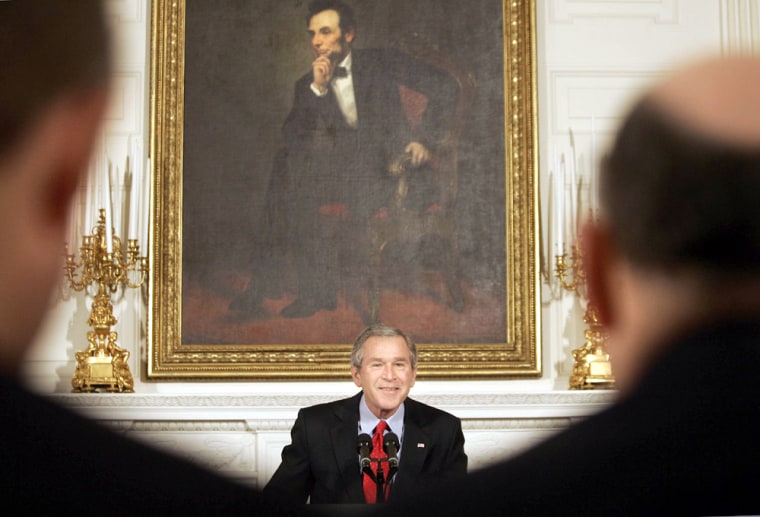President Bush told the nation’s governors on Monday that he recognizes their alarm over soaring Medicaid costs and proposed federal cutbacks and vowed to work with them to try to reach common ground.
“We want Medicaid to work,” Bush said. “We also recognize that the system needs to be reformed. And we want to work with you to do so,” he added.
While overhauling Social Security dominates discussions in the nation’s capital, financing problems with Medicaid — the federal program of health care for the poor — is commanding most of the attention in the 50 state capitals.
‘On the front line of Medicaid’
“The governors are on the front line of Medicaid, I know full well,” Bush said.
The president has sought $40 billion in cuts in the health care program. Much of that would come from stopping states from using certain accounting techniques to draw down federal Medicaid funds. The administration contends the states are exploiting loopholes that cheat taxpayers.
Bush also defended his decision to push for Social Security change, even though some reviews suggest the federal retirement program won’t in financial trouble until mid-century.
“I want to do something about it now,” Bush said. “I’m coming to a lot of your states” to promote allowing younger workers to divert some of their Social Security taxes into bonds and stocks.
Bush also mentioned the ongoing conflict in Iraq. “I know a lot of you have Guard troops Iraq. I want to thank you,” Bush said. “Whether you agree with my decision or not, you’ve done your duty as commanders in chief to support the troops and I appreciate it a lot, but more importantly, they appreciate it.”
Governors brought a mixed message to the meeting with Bush and his Cabinet: Republicans and Democrats alike are bucking the president’s budget cuts to Medicaid, while embracing some of his reforms and pushing for federal willingness that would allow states to experiment more.
Severe problems seen from cuts
The Medicaid cuts would cause severe problems at home, governors said. “I don’t think there are any divisions among governors” on the spending reductions, said Ohio Gov. Bob Taft, a Republican. “The real issue is it’s governors against the White House and Congress.”
At the same time, governors of both parties attending their annual winter meeting say the $300 billion-plus, 52 million-patient program is growing too fast to continue with the status quo. It’s time for bigger reforms.
Their line echoes the stance of Health and Human Services Secretary Mike Leavitt, a former Utah governor. Leavitt spent much of the two days leading up to the White House meeting trying to win support for Bush’s budget proposals and hearing the concerns of governors, according to state chief executives and Leavitt aides.
But consensus was elusive on either sweeping support or sweeping reforms. So far, governors agreed only to oppose the cuts and tentatively embrace elements of the budget plan that aim to drive down drug prices and discourage the middle-class elderly from relying on Medicaid for nursing home care.
Rather than spending dollars and political capital revamping Social Security, Bush should consider deeper changes to Medicaid, the nation’s single largest health care program, several governors said.
Medicare, Medicaid seen as pressing issues
“From where I sit, Medicaid and Medicare are much more pressing issues,” said Arizona Gov. Janet Napolitano, a Democrat.
Governors want to see a greater willingness from the federal government to allow for widespread experimentation.
The program is exploding because of demographic changes driving more and more elderly onto the program, which cares for two-thirds of the nation’s nursing home residents. Rolls are swollen, too, when private employers drop health care for employees, who turn to the state.
Medicaid enrollment jumped 40 percent in the past five years, and spending has soared, too. From 2001-2004, Medicaid spending grew by more than 50 percent. For states, that growth has meant that state spending on Medicaid has overtaken the amount spent on K-12 education.
Leavitt has maintained that it’s time for an “uncomfortable, but necessary conversation” between the federal government and the states on reining in the system.
Governors say they’re willing — but only if the changes spur efficiencies, and don’t simply push the costs to the states.
